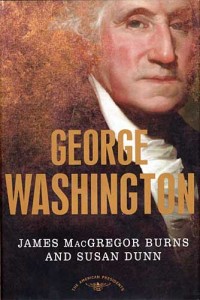By James MacGregor Burns and Susan Dunn
In March 1775, representatives from Virginia’s counties met to choose delegates to the Second Continental Congress, and once again they elected Washington, Peyton Randolph, Patrick Henry, and others. They also voted to prepare their colony to defend itself, heeding Henry’s stirring call, “We must fight! Give me liberty or give me death!” Especially after the clash of British troops and American volunteers at Lexington and Concord in April, Americans indeed were experiencing new feelings of militant patriotism. . . .
The situation in the country was dangerous and critical, the Congress declared, and delegates voted that all the colonies be put immediately into a state of defense. In a fateful step, Congress then declared that the volunteer soldiers in Boston would form a new Continental Army, to which six companies of riflemen would be added, and it authorized salaries for the soldiers.
But who would lead that army? John Adams proposed George Washington. It was a brilliant suggestion: a Virginian commander in chief leading Massachusetts volunteers would immediately transform the army into a truly national force. Even before the colonies declared war or independence, even before they constituted a nation, they would have in Washington a national leader. “He seems discrete and virtuous,” wrote another New Englander at the time, “no harum-scarum, ranting swearing fellow, but sober, steady, and calm.” While delegates debated his nomination, Washington quietly absented himself. Finally, his unanimous selection as commander in chief was announced. “The liberties of America depend upon him,” wrote John Adams to his wife two days later.
Washington had achieved what he had always desired: center stage in the life of his country. Notice and esteem were his. He thanked the members of the Continental Congress for the high honor they had bestowed upon him and promised to exert all the power he possessed “for the Support of the glorious Cause.” And yet he also expressed more than a little ambivalence about his new role. Aware of the vicissitudes of Fortuna and the role of luck in leadership and conscious as ever of the importance of his reputation to him, he commented that “lest some unlucky event should happen unfavourable to my reputation, I beg it may be remembered by every Gentleman in the room, that I this day declare with the utmost sincerity, I do not think my self equal to the Command I am honoured with.” In his conclusion, he refused all compensation, except for his own expenses, explaining that he had not accepted this position for any “pecuniary considerations.” His words communicated gravitas and modesty: he portrayed himself in public as humbled by power, wary of its awesome responsibilities.
A few days later, in a letter to his wife, Martha, he informed her that he had accepted the command of the Continental Army—reluctantly. “It was utterly out of my power to refuse this appointment,” he wrote, “without exposing my character to such censures as would have reflected dishonor on myself and given pain to my friends.” Then, in a warmer note, he confessed that he would enjoy “more real happiness and felicity” at home with her for one month than on the world stage for fifty years. Yet, he mused, “a kind of destiny” to which he could only accede had imposed this high position and burden on him. The following month, writing to a fellow officer, he repeated his message that “sacrifice” for one’s country bestowed on a man more “real Honor than the most distinguished Victory.” From now on, he promised, he would devote himself solely to “American Union and Patriotism.” All smaller and partial considerations would “give way to the great and general Interest.”

Excerpted from George Washington by James MacGregor Burns and Susan Dunn.
Copyright © 2004 by Times Books, an imprint of Henry Holt and Company.
Reprinted with permission of the publisher.
JAMES MACGREGOR BURNS is the Woodrow Wilson Professor of Political Science Emeritus at Williams College. He is the author of numerous books, including George Washington and the Pulitzer Prize–winning Roosevelt: The Soldier of Freedom.
SUSAN DUNN is a professor of literature at Williams College and author of many books, including George Washington and The Three Roosevelts.
